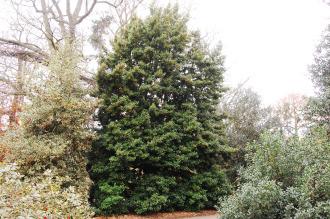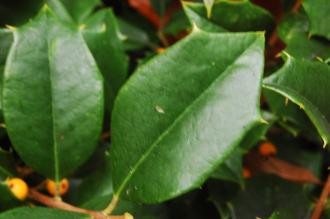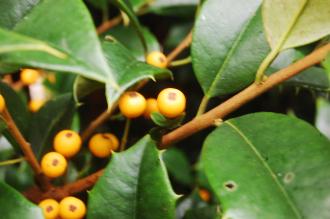
Ilex opaca ‘Xanthocarpa’ (07/12/2015, Kew Gardens, London)
Position: Full sun to partial shade
Flowering period: Late spring
Soil: Moist, well drained
Eventual Height: 10m
Eventual Spread: 6m
Hardiness: 5b, 6a, 6b, 7a, 7b, 8a, 8b, 9a, 9b
Family: Aquifoliaceae
Ilex opaca ‘Xanthocarpa’ is an evergreen large shrub or small tree with a pyramidal habit. Its glossy leathery dark green leaves are elliptic with entire spiny margins, up to 8cm long and 4cm broad. Its bark is gray and smooth. This variety is a female form of Ilex and will not produce male pollen, a male Holly will need to be in close proximity in order for this plant to produce berries. Its white flowers are small and appear in clusters. Its orange/ yellow fruit are berries, up to 10mm across and these persist on the plant through the winter months.

Ilex opaca ‘Xanthocarpa’ Leaf (07/12/2015, Kew Gardens, London)
Ilex opaca ‘Xanthocarpa’, commonly known as Yellow Fruited American Holly, is native to east USA.
The etymological root of the binomial name Ilex is derived from the old Latin name for the Holly. Opaca is derived from the Latin opacum menaing ‘shaded’.
The landscape architect may find Ilex opaca ‘Xanthocarpa’ useful as a specimen shrub with attractive winter fruit. It may also be grown as a formal hedge and effective barrier. Once established it will tolerate maritime conditions.

Ilex opaca ‘Xanthocarpa’ Fruit (07/12/2015, Kew Gardens, London)
Ecologically, Ilex opaca ‘Xanthocarpa’ flowers are attractive to pollinating insects. The canopy of this shrub forms an effective shelter for nesting birds.
Ilex opaca ‘Xanthocarpa’ prefers moist, fertile, well-drained soils. It tolerates most pH of soil.
Ilex opaca ‘Xanthocarpa’ requires little maintenance. If maintaining as a hedge it should be cut in late autumn to early spring. If necessary it may also be cut in mid summer, but winter berries may be lost.

Landscape Architecture

